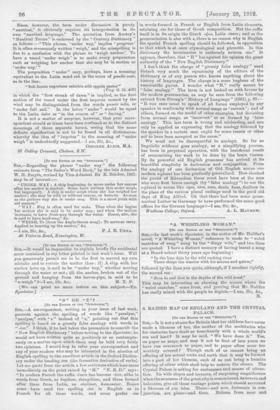"S" OR "Z" P [To THE EDITOR or THE "SPECTATOR. " ] SIR,—A
correspondent, writing in your issue of last week, protests against the spelling of words like "paralyse," "analyse," with " z " instead of " s," pointing out that this spelling is based on a grossly false analogy with words in " -ize." I think, if he had taken the precaution to consult the "New English Dictionary" before writing to the Spectator, he would not have written quite so positively or so contemptu- ously on a matter upon which there may be held very fairly two opinions. I would beg to refer your correspondent and any of your readers who may be interested in the niceties of English spelling to the excellent article in the Oxford Diction- ary under the beading nu (the formative derivative of verbs). Let me quote from the article a few sentences which bear more immediately on the point raised by "H." "N. E. D." says : " In modern French the suffix -leave has become -iser, alike in words from Greek, as baptiser, evangeliser, and those formed after them from Latin, as civiliser, humaniser. Hence some have used the spelling -ise in English as in French for all these words, and some prefer -ice in words formed in French or English from Latin elements, retaining -lee for those of Greek composition. But the suffix itself is in its origin the Greek -gCsde, Latin -leave; and as the pronunciation is also with a, there is no reason why in English the special French spelling should be followed, in opposition to that which is at once etymological and phonetic. In this dictionary the termination is uniformly written -in." It appears, therefore, that " H." has against his opinion the great authority of the " New English Dictionary."
I don't think the charge of "grossly false analogy" need disturb very much the equanimity of the editors of the dictionary or of any person who knows anything about the history of languages. The charge is a mere bugbear of the unscientific: purist. I wonder what "H." really means by " false analogy." The term is not looked on with favour by the modern grammarian, as may be seen from the following extract from Strong's " History of Language " (1891), p. 83 :- " It was once usual to speak of all forms employed by any speaker in conformity with normal usage as ' correct' ; and of others, formed on the model of other examples, but deviating from normal usage, as 'incorrect' or as formed by ' false analogy.' This last term is wrong and misleading, and can only be applied as expressing that the analogy followed by the speaker in a certain case ought for some reason or other not to have been accepted as the norm."
We must not be disrespectful to analogy. So far as linguistic evidence goes analogy, as a simplifying process, has been in perpetual operation, with the beneficent result of economizing the work to be done by the brain tissues. By its powerful aid English grammar has arrived at its beautiful simplicity in declension and conjugation. From the analogy of one declension of Old English nouns our modern s-plural has been gradually generalized. How shocked the purist of Edwardian times must have been at the men who were first brave enough (by "false analogy ") to use the s-plural in nouns like eyes, ears, sons, deeds, hens, feathers in the place of the various plural endings used in the good old days of King Alfred. Oh that there bad been some gram- matical Luther in Germany to have performed the same good
offices for the German language am, Sir, &c.,










































 Previous page
Previous page